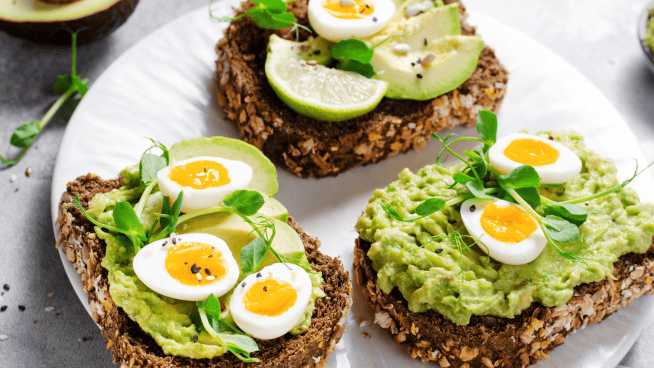Easy Tips to Optimize the Sprinter’s Diet
Done right, a sprinter’s race lasts only a few seconds. Sprinting is not an “easy” sport. But the sprinter’s diet might be a little different from those of other athletes, because sprinters’ bodies use different energy systems during their races.
Three energy systems produce adenosine triphosphate (ATP), the body’s main source of energy. One of the three is the ATP-PhosphoCreatine (PC) system, which allows an athlete to exert maximal effort for approximately 12 seconds. Activities that use this system include heavy lifting for low repetitions, pitching a baseball and—you guessed it—sprinting.
Sprinters aim to increase muscle mass and power for their explosive event, so protein is clearly important. However, if carbohydrate and fat intake are insufficient, both energy levels and muscle mass will suffer. Remember, carbohydrates and protein work together to build muscle. Sprinters should be concerned with maintaining energy levels during training, ensuring quick recovery time and achieving a high power-to-weight ratio.
General Nutrition Guidelines For Sprinters
- Focus on getting 1.2 to 1.5 grams of protein per kilogram of body weight.
- Carbohydrate intake should be at 5 grams per kilogram of body weight to maintain glycogen stores during training (although carbohydrate is not the prime source of fuel during the actual race).
- Creatine supplementation may increase muscle mass, but weight gain is possible. Research has shown that creatine supplementation for sprinters results in either a slight performance enhancement or no change in sprint velocity. If you’re going to use creatine, it might make more sense to do it during your training, not on race day.
Race Day Sprinter’s Diet
The race itself only lasts a few seconds, but it can be difficult to hone in on your nutritional strategy, since you may race in multiple heats and events. Since glycogen is not being used, carbohydrate loading is unnecessary. The key is to stay hydrated and keep your blood sugars stable so you feel comfortable. A healthy balance of carbs and protein three to four hours prior to the race is recommended. Sample meals include:
- baked potato and Greek yogurt
- lean protein (chicken, turkey, etc.) and beans or brown rice
- turkey sandwich
- cereal with cottage cheese
If you’re hungry, eat a low-fiber/low-fat snack approximately one hour before the event. Examples include low-fat yogurt, a smoothie or a low-fiber protein bar. Don’t try anything new on race day, and be sure to run fast!
RELATED:
RECOMMENDED FOR YOU
MOST POPULAR
Easy Tips to Optimize the Sprinter’s Diet
Done right, a sprinter’s race lasts only a few seconds. Sprinting is not an “easy” sport. But the sprinter’s diet might be a little different from those of other athletes, because sprinters’ bodies use different energy systems during their races.
Three energy systems produce adenosine triphosphate (ATP), the body’s main source of energy. One of the three is the ATP-PhosphoCreatine (PC) system, which allows an athlete to exert maximal effort for approximately 12 seconds. Activities that use this system include heavy lifting for low repetitions, pitching a baseball and—you guessed it—sprinting.
Sprinters aim to increase muscle mass and power for their explosive event, so protein is clearly important. However, if carbohydrate and fat intake are insufficient, both energy levels and muscle mass will suffer. Remember, carbohydrates and protein work together to build muscle. Sprinters should be concerned with maintaining energy levels during training, ensuring quick recovery time and achieving a high power-to-weight ratio.
General Nutrition Guidelines For Sprinters
- Focus on getting 1.2 to 1.5 grams of protein per kilogram of body weight.
- Carbohydrate intake should be at 5 grams per kilogram of body weight to maintain glycogen stores during training (although carbohydrate is not the prime source of fuel during the actual race).
- Creatine supplementation may increase muscle mass, but weight gain is possible. Research has shown that creatine supplementation for sprinters results in either a slight performance enhancement or no change in sprint velocity. If you’re going to use creatine, it might make more sense to do it during your training, not on race day.
Race Day Sprinter’s Diet
The race itself only lasts a few seconds, but it can be difficult to hone in on your nutritional strategy, since you may race in multiple heats and events. Since glycogen is not being used, carbohydrate loading is unnecessary. The key is to stay hydrated and keep your blood sugars stable so you feel comfortable. A healthy balance of carbs and protein three to four hours prior to the race is recommended. Sample meals include:
- baked potato and Greek yogurt
- lean protein (chicken, turkey, etc.) and beans or brown rice
- turkey sandwich
- cereal with cottage cheese
If you’re hungry, eat a low-fiber/low-fat snack approximately one hour before the event. Examples include low-fat yogurt, a smoothie or a low-fiber protein bar. Don’t try anything new on race day, and be sure to run fast!
RELATED:










